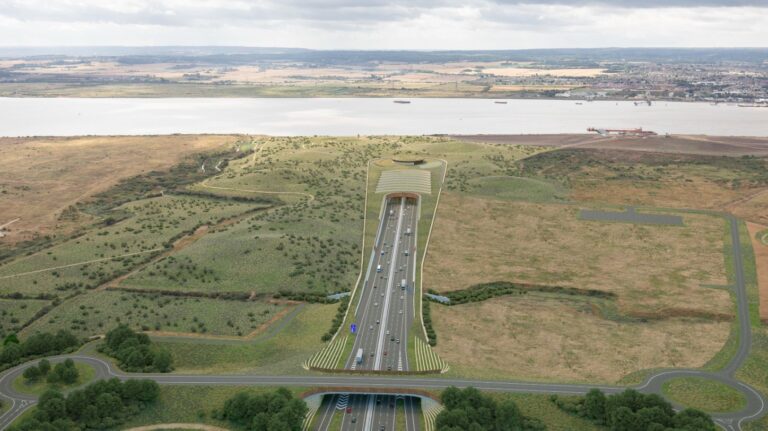On 25 March 2025, the UK’s secretary of state for transport, Heidi Alexander MP, granted development consent for the Lower Thames Crossing, a new road crossing connecting Kent, Thurrock and Essex.
The road will span approximately 14.5 miles in length, and will connect to the existing road network from the A2/M2 to the M25 with two tunnels (one southbound and one northbound) running beneath the River Thames.
An application was submitted to the Planning Inspectorate for consideration by National Highways on 31 October 2022, and was accepted for examination on 28 November 2022.
During this examination process, the government says ‘the public, statutory consultees and interested parties were given the opportunity to give evidence to the Examining Authority’, and recommendations were made to the secretary of state on 20 March 2024.
National Highways says the Lower Thames Crossing will ‘ease congestion at Dartford by almost doubling road capacity across the Thames east of London, and make tens of millions of journeys quicker, safer and more reliable every year’.
It confirmed that, as chancellor Rachel Reeves alluded to in January 2025, the government is currently exploring private finance options for the project. Furthermore, it outlines that ‘construction could start as early as 2026, with the new road expected to open in the early 2030s’.
Matt Palmer, National Highways executive director for the Lower Thames Crossing, commented: “The Lower Thames Crossing is one of the UK’s most important infrastructure projects. It will unlock growth with quicker, safer, and more reliable journeys and redraw the blueprint for building major projects in a net zero future by scaling up the use low-carbon construction, and leaving a legacy of green spaces and green skills.”
And Steve Parker, director of the British International Freight Association (BIFA), said: “This is a great result for the campaign, backed by politicians and businesses, as well as BIFA, for a project that was first mooted in 2009 as a means of addressing the problems that congestion at the Dartford Crossing causes.
“Media reports indicate that work will commence in 2026 and could be complete by 2032. Our members, who manage the transport of a considerable amount of the UK’s visible trade, will be delighted. Delays in transit pose a risk to their reputations, and have significant financial consequences.”
Another person who has been outspoken on the development of the Lower Thames Crossing is Andrew Baxter, CEO of Europa Worldwide Group. Logistics Manager recently visited the logistics operator’s headquarters in Dartford, and spoke to the people there who know firsthand the issues congestion at the Dartford crossing can cause.
Following the announcement on 25 March, Baxter said: “The government’s decision to grant development consent for the Lower Thames Crossing is certainly a welcome one. Going forward, the government must prioritise funding this investment, which will streamline UK supply chains and help grow the economy.
“Logistics UK previously estimated that up to £200 million is lost every year in productivity due to congestion at the Dartford Crossing, with businesses across the country feeling the pressure of delays to delivery and stifled trade.
“For UK exporting businesses – many of whom are key contributors to the UK economy – this can cause thousands of pounds worth of delays, which risks reputations and has huge financial ramifications if consumer demand can’t be met.
“Therefore, we have always supported the campaign for the Lower Thames Crossing. The alternative 23km trade link between Essex and Kent will connect the North, Midlands and Channel Short Straights, where over half of all goods are traded between the UK and EU. Ultimately, this will drive growth for British businesses, offering them more opportunities to trade with their British and European markets, and thus boost our economy.”
He continued: “There is also a huge personal advantage for people in Dartford, where our 27,000ft2 European road transport hub is located. Currently, more than 300 of our employees must navigate vast amounts of congestion just to get to and from work. Having an alternative route will certainly alleviate the strain on the local population who, rather than spending extra hours stuck in traffic, can spend it in the comfort of their homes.
“If growth is a priority for our government, the importance of an alternative trade route cannot be understated, and it is vital that they find appropriate funding for the investment. The Lower Thames Crossing promises a significant solution, streamlining connections across the UK and into Europe, improving transit times, and enabling economic prosperity.”
Logistics UK CEO David Wells OBE added: “Businesses up and down the country are currently hamstrung by delays crossing the Thames, so the government’s decision to approve the Lower Thames Crossing Development Consent Order (DCO) is excellent news.
“The scheme has been in the planning stages for over a decade and this is a momentous decision: industry is united in its backing for this vital trade route and when completed will unlock UK logistics, drive growth and help keep supply chains moving across the whole country.”







